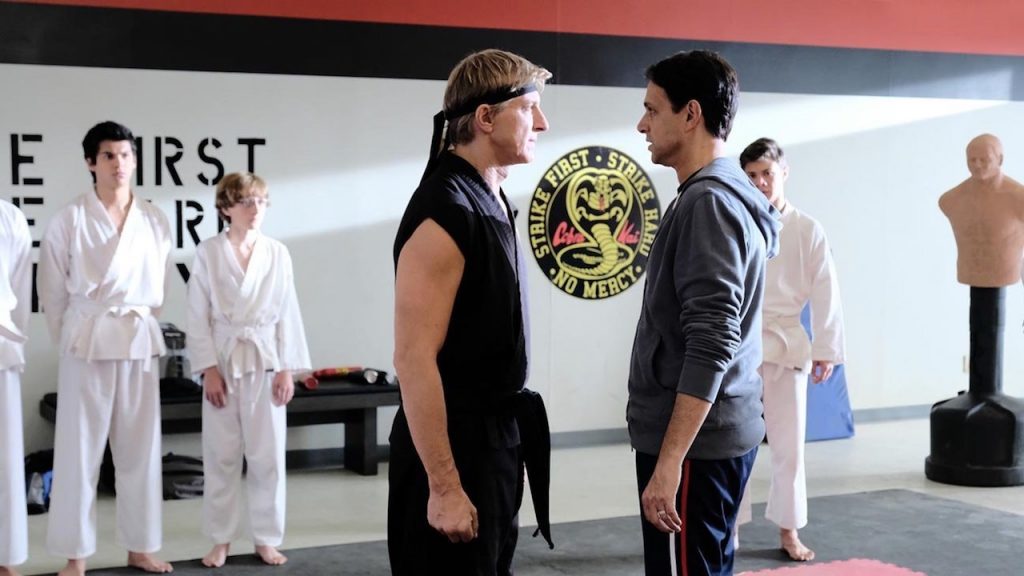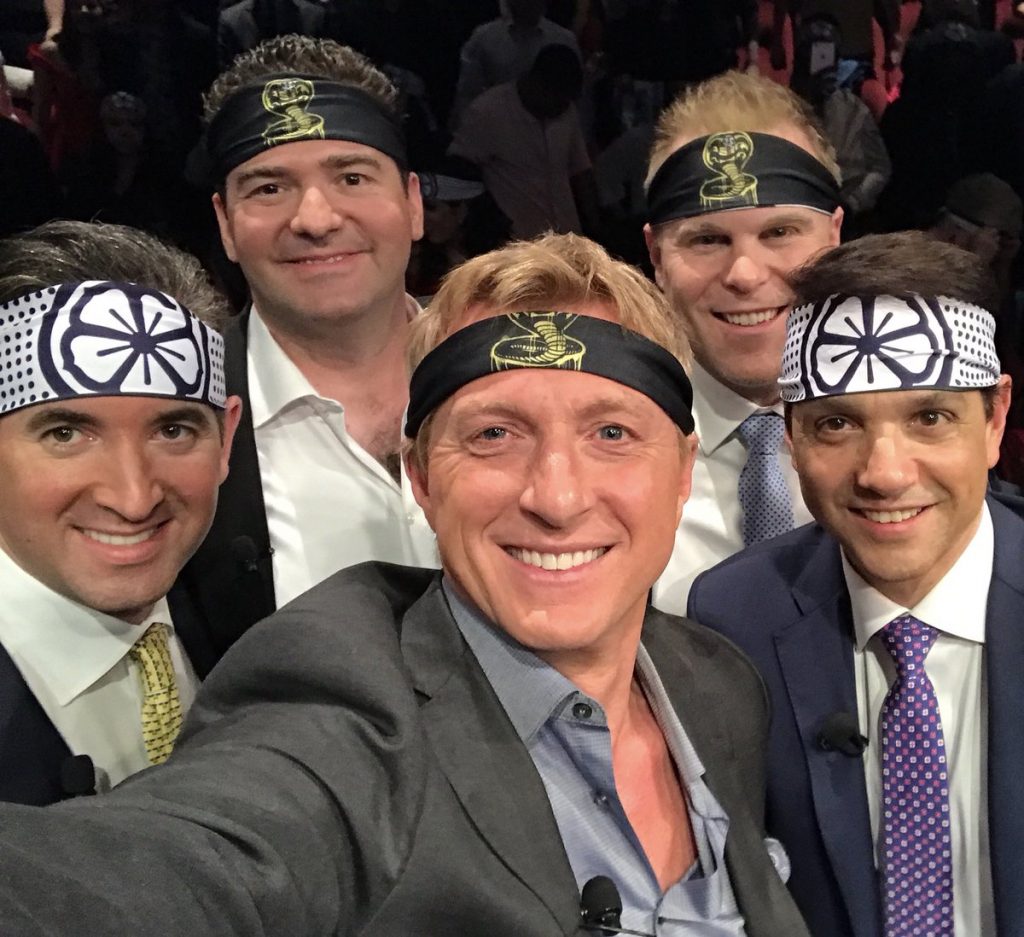
Three years ago, Hollywood screenwriters Jon Hurwitz W’00 and Josh Heald W’00 were driving down the Sunset Strip when they spotted a billboard for Fuller House, the Full House reboot on Netflix. From high above, the now-grown-up trio of D.J. Tanner, Stephanie Tanner and Kimmy Gibbler grinned down at them under the words “Guess who’s back?”
“We looked at each other and said, if Kimmy Gibbler can be on a billboard, why not Daniel LaRusso and Johnny Lawrence?” Hurwitz remembers.
Both Hurwitz and Heald had grown up worshipping The Karate Kid, which debuted in 1984 and stars Ralph Macchio and William Zabka as roundhouse-kicking, leg-sweeping nemeses LaRusso and Lawrence. The movie was one of many mutual favorites that Heald and Hurwitz bonded over when they met as freshmen at Penn—and now they’ve returned it to the zeitgeist with Cobra Kai, a series that blends the original stars with new cast members.
The story picks up 34 years after the first Karate Kid left off. Former bully Johnny Lawrence is now a deadbeat who starts his morning with sips of yesterday’s beer. LaRusso runs a thriving car dealership and has a seemingly charmed life, but he’s often adrift without his late mentor, Mr. Miyagi.
“The characters are the reason we felt it was ripe for bringing back,” Hurwitz says. “These are characters that people all over the world connect to.”
He and Heald were especially keen to revisit Lawrence, the quintessential 1980s high school bully. “We felt it would be really interesting to explore bullying today, the effects of bullying, where a bully comes from, and what happens to a bully,” Hurwitz says. As he’s put it before, they wanted to give Zabka’s Lawrence “the Better Call Saul treatment.”
By the time they spotted Gibbler (played by Andrea Barber) on Sunset, both alums had already found success in Hollywood writing R-rated buddy-adventure comedies that generated sequels. For Hurwitz, it was Harold and Kumar Go to White Castle. For Heald, Hot Tub Time Machine. They were still close friends and often each other’s first readers for script drafts, but until Cobra Kai, they’d never worked together on a project that made it to audiences. (They created and write the series with Hurwitz’s childhood friend and longtime writing partner Hayden Schlosseberg.)
Cobra Kai debuted on YouTube Premium—a subscription version of the site—last spring. It holds a rare 100% “fresh” critic rating on Rotten Tomatoes, and according to YouTube’s data, the first episode has been viewed more than 63 million times. Just eight days after Cobra Kai premiered, YouTube announced that the show would be back for a second season. Last month, that new season arrived, and shortly after came an announcement to expect Season 3 in 2020.
More often serious or quietly amusing than choke-on-your-popcorn hilarious, the show is a significant departure from the films both alums are best known for. But they don’t see it that way.
“We were always drawn to the emotional journey of characters first and foremost and the comedy was the bells and whistles that would help entertain the audience,” Hurwitz says. “With Cobra Kai, it was the same instinct of storytelling and character-building that drew us to it, and our natural instincts of how to entertain led to the tone that’s there.”
There must be some satisfaction, though, in showing off a different side of their writing chops and having critics and viewers embrace the results. “Absolutely,” Hurwitz says. “It’s exciting for us to see people connecting to the different skills that we believed we had inside of us all along.”
Still, it was a long journey from idea to screen. After coming up with the Cobra Kai concept, they had to get permission from the current Karate Kid rights holder (that would be Will Smith and his company Overbrook Entertainment), land another okay from Sony, and entice Zabka and Macchio to join the fun. Then they could finally start pitching to TV execs.
From the beginning, Heald says, they wanted the show to land on a premium cable channel or streaming platform. YouTube was their first pitch and “they stepped up right away,” he says. “They were really in the market for something like this, which they knew could be a global hit, and they got very aggressive.”
“We didn’t change the show in any way to fit into YouTube,” Heald adds. “This is the same show it would have been anywhere else.”
But does knowing that Cobra Kai is as likely to be watched on a tablet, laptop or even phone as it is to be streamed onto an actual TV affect their approach to making it? “We write and make the show as if it’s going to be projected on a giant screen in a movie theater,” Hurwitz says, with Heald adding that “if people want to ruin it and watch it on their phones, that’s their right, but we don’t advocate that.”
One thing they do expect is binge-watching. “We write each season kind of like a five-hour movie that’s best enjoyed like eating an entire birthday cake,” Heald says. “We want our audience to be tired the next morning because they had to keep pressing play on the next episode.”
Heald describes the joy of getting to “play in the sandbox of our favorite movie” for the past few years, and of knowing there is still more ahead with Season 3. “We’re going to work every day writing scenes and dialogue for characters that hadn’t had scenes and dialogue written for them in over 30 years,” he says. “We reached back into our childhood and it wasn’t ruined for us and so far we’re not ruining it either.”

(Source: Twitter @jonhurwitz)
Cobra Kai has also meant that the college pals who once shared a Baltimore Avenue house in the late 90s—and watched Howard Stern’s Private Parts there twice in a row for no particular reason—are now roommates again. When the show shoots in Atlanta, where production is based for several months at a time, Hurwitz, Heald and Schlosseberg (a frequent visitor at their old off-campus house) all live and work together.
“It’s almost like you’re back in college,” Hurwitz says, “but with a hell of a lot more pressure and more work to do.”
—Molly Petrilla C’06

